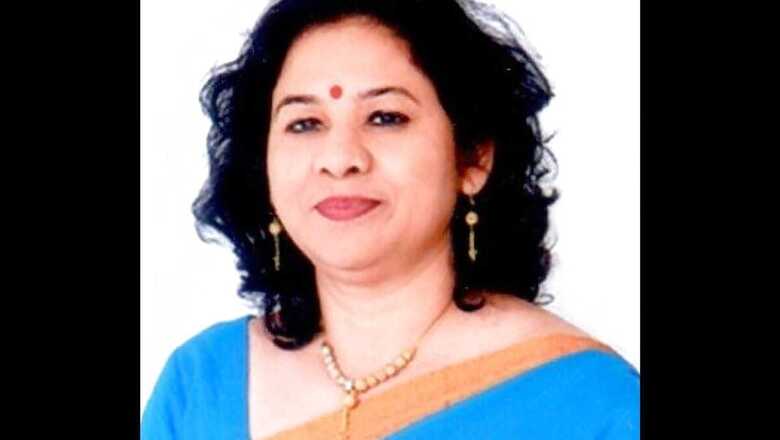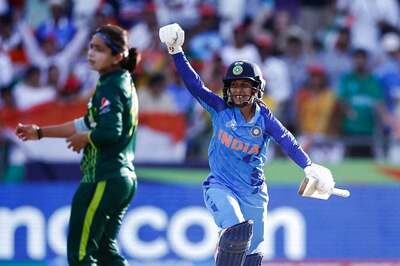
views
Professor Saroj Sharma is not much delighted about being the first woman to head the National Institute of Open Schooling, as she said, “Today women are everywhere”. She joined in December 2020.
Sharma is the author of books that talk about the significance of ancient sciences in contemporary times. She wants “distortions to go from the curriculum, where medieval history gets more representation in history textbooks than the history of ancient India.” She is working on promoting self-learning material on Indian Knowledge Systems by translating them in Hindi, English and eight other foreign languages.
She has been the first Dean of the University School of Education, Guru Gobind Singh Indraprastha University, New Delhi, in the respective stream of Education. She has been a member of the consultation committee constituted by the National Council for Teachers Education for the formulation of New Education Policy-2016 under the umbrella of the Ministry of Education, along with being the member in a few other educational program implementation committees (PICs) of the government.
Excerpts of an interview with Professor Saroj Sharma
You are the first woman to head NIOS since it was established in 1989. What are your thoughts?
What I have seen is there are many women in the teaching profession and they dominate the field but we don’t find them at the head of the administration or as administrators. I have been in the teaching profession and I am not so much delighted because women are everywhere. I have to perform as an administrator not looking at it in a gender specific way. Women are known to be balanced in administrative roles. I am here at the time when there are greater responsibilities ahead especially implementation of the new National Education Policy. I find things stuck and would like to focus on getting things moving.
Can you tell more about the important responsibilities ahead with the implementation of NEP and the role of NIOS?
I would like to go back to the start of the pandemic. We witnessed the extreme times of lockdown and that time, apart from NIOS students, the students from other boards CBSE, ICSE, all benefited from our TV channel — Pradhan Mantri E-Vidya channel. We used to broadcast on TV, Radio and the teaching programmes would run for eight hours continuously from our studio. With this, the importance of digital medium was proved. NIOS is catering to the world’s largest students through distance mode, and we are prepared for online education.
I think we have that kind of role in NEP – online education, IT infrastructure, artificial intelligence. In the document stress has been given on these issues and NIOS is already prepared for it. We have been entrusted with this kind of role. One more important aspect, NEP talks about diffusion of streams after NCF students will be allowed to take any subject of their choice, but as far as NIOS is concerned we are already following this format. We don’t have any particular stream in class 12th. There is free choice. We were future prepared for the vision in NEP and experienced in these provisions.
The Ministry of Education will be launching the self-learning material for Indian Knowledge Traditions prepared by NIOS. What is the objective?
The Ministry of Education will soon launch the ‘self-learning material on Indian knowledge systems’, maybe in March. In fact at the 10th and 12th level, we at NIOS are already offering the courses on Veda, Yoga, ancient sciences etc. We have now prepared the self-learning material at OBE (Open Basic Education) up to class 8th. Earlier this was taught in Sanskrit medium only, and we are now launching the translated version in Hindi and English. It is an important step because we are nurturing and educating the human race, and we have to give knowledge to our future generation from the early stage. In time to come NIOS is going to have this material translated in eight foreign languages to take the Indian Knowledge Traditions to the world.
There is an effort to revisit history. The PM recently said, “The injustice and manipulation done to those who created history, by those who wrote history is being corrected by today’s India”. What do you have to say about the emphasis being made on rewriting history?
Our children only know about the history of 1,000 years but we have a history of more than 5,000 years. And we are taught in a certain way where the medieval part is given more importance, post-independence is given less importance and colonial is given much importance in our history books, so our children must know what was there in our ancient India, which is covered in 2-3 pages. We need research for that period. Even if we know about ancient sages, it is not covered much.
After the NEP, we are now going to frame the NCF and this kind of historical knowledge and cultural heritage must be part of our textbooks. Students must be taught what was before 1,000 years. That knowledge must be given to our students so that they feel proud of our culture and history. It needs to be coupled with teachings on how to be a good citizen. Our curriculum has to give emphasis on citizenship knowledge, values and morals of a citizen I mean. NIOS is working on making every subject value based and critical thinking.
Can you tell us about the international webinar on Hindi language that is going to take place with NIOS next week?
We recently signed an MoU with Mauritius to conduct and promote workshops for Hindi language. Hindi ka prachar kaise ho… we will deliberate on it.
Read all the Latest News, Breaking News and Coronavirus News here



















Comments
0 comment